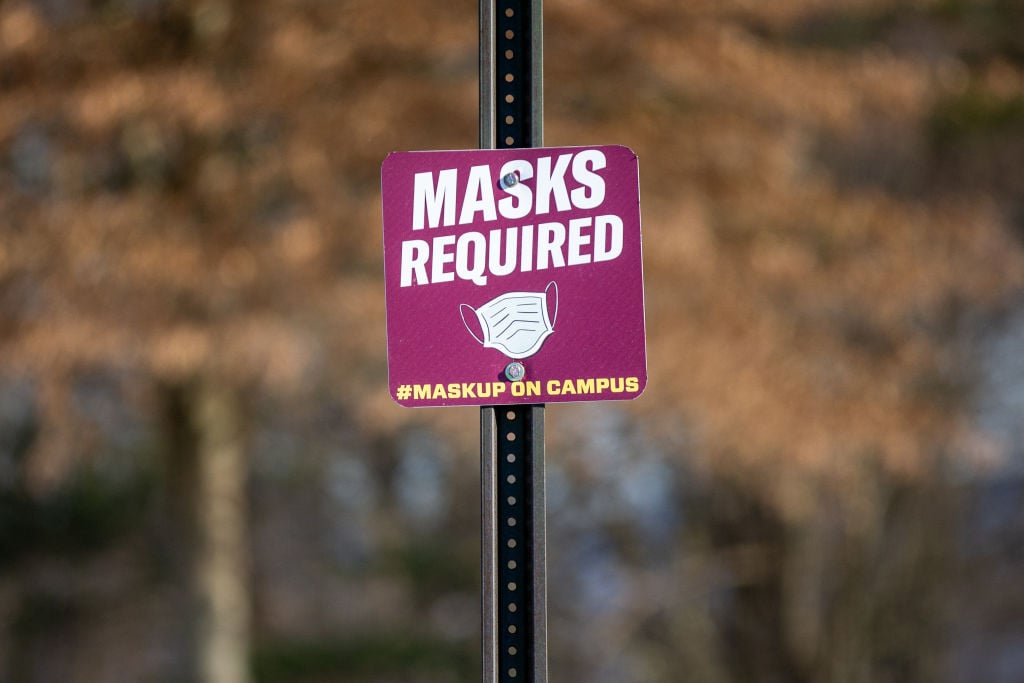
COVID-19 cases are on the decline nationwide. College campuses are another story.
Though the large, mostly public universities that set records for their high case counts last semester are actually doing better than they did last term, other campuses -- including those that kept cases low in the fall -- are seeing numbers rise.
Boston College, for example, set a new record on Sunday for most cases in a week, with 95 cases among students.
The college, like some others, said the blame fell on students, specifically freshmen, who have not been following safety rules. The situation means further restrictions, such as a no-guest policy or the premature closure of campus, could be on the table if things don’t improve, Michael Lochhead, acting vice president for student affairs, said in an email to students.
“This rise in cases is a direct result of students letting their guard down with respect to pandemic health precautions,” he wrote. “The pattern of cases clearly demonstrates that many students are ignoring the basic health and safety protocols that allowed us to remain in-class and in-person on campus during the first semester.”
The administration suspended some students or evicted them from college housing for holding large gatherings without masks, Lochhead wrote.
Other institutions have suggested their higher numbers are due to generally high case counts across the country. While the trend line for nationwide daily counts is currently in steep decline, colleges and universities started their semesters during a countrywide high point. When more students arrive on campus with COVID-19, there is likely to be more spread.
Duke University, for example, found only 26 students with positive test results during fall’s entry testing. This semester, it found 56. The university received much positive attention for its safety protocols last term, but it has already overshot its fall case numbers.
Many colleges are testing more of their students more frequently this semester. However, they also have brought more students to their campuses and are holding more in-person classes.
While the increase in testing is good, not all tests are equal, said Chris Marsicano, director of the College Crisis Initiative at Davidson College earlier this month. Many institutions, he said, are using antigen tests to diagnose COVID-19. Those have a higher false negative rate than PCR tests, which are the current gold standard.
“PCR tests are expensive,” he said. “Just because you’re testing multiple times a week doesn’t mean you’re catching all the cases.”
More frequent testing and the arrival of a vaccine, both good things, could also give some students a false sense of security, Marsicano said.
“You think, ‘Hey we’re testing all the time, I got a negative, I’m fine, I can go party now,’ when in reality that added risky behavior is likely to spread the disease even with a negative test,” he said.
A number of other colleges are adopting or looking at tighter restrictions, but to varying degrees of strictness. The University of Miami, for example, ordered new restrictions on student gatherings and some in-person activities earlier this month. But in-person classes were still on, and the gym and pool were still open. Students were allowed to go outside for work, internships and exercise. The university lifted some restrictions this week.
The University of Massachusetts at Amherst, on the other hand, issued a stricter lockdown Feb. 7. The new policies prohibit students from leaving residences except to get food or medical care or for mandatory COVID-19 tests. Even exercising outside alone is currently banned. (The administration has said it may lift some of its restrictions before two weeks, if things are going well, and is offering virtual fitness classes to students.)
Other colleges that have announced new restrictions in the past two weeks include Calvin University, Clarkson University, Franklin Pierce University, Georgetown University, Plymouth State University, Providence College, the University of New Hampshire and the University of Virginia.
New variants are also making their way onto college campuses, though it’s unclear so far if they are driving significant spread. Researchers say the B.1.1.7 variant of the virus, first reported in Britain, is more easily transmissible and may potentially be more deadly.
In the past week, three additional institutions reported that they now have cases of the variant on campus. They are Davidson College, the University of Central Florida and UVA. Those three join six other institutions, bringing the total to at least nine.
On some of those campuses, the variant arrived via student travel to Britain. In others community spread is suspected. The variant has been found in 42 states and 1,277 people so far, according to the Centers for Disease Control and Prevention.
Typical COVID-19 diagnostic tests don’t check for the B.1.1.7 variant, so in most cases, it’s only found where people are searching for it. At Virginia Polytechnic Institute and State University, President Tim Sands told students that they should assume it has already infiltrated their community.
“We are seeing evidence among our student population that the prevalence of moderate symptoms is increasing,” Sands wrote in a message to campus.
While the spread of the new variant in part led to strict lockdowns in Britain, stateside the response has been more muted. Experts have urged the public to strictly adhere to hand washing and social distancing. The CDC has recommended wearing two masks instead of one.
The high case counts on college campuses have been given new import because of new data released last month suggesting that colleges that returned to in-person instruction led to increased infections in the counties where they are located. College leaders and campus health officials have largely disputed the claim.
"again" - Google News
February 18, 2021 at 03:07PM
https://ift.tt/3shddGr
Cases rise (again) on college campuses - Inside Higher Ed
"again" - Google News
https://ift.tt/2YsuQr6
https://ift.tt/2KUD1V2
Bagikan Berita Ini














0 Response to "Cases rise (again) on college campuses - Inside Higher Ed"
Post a Comment